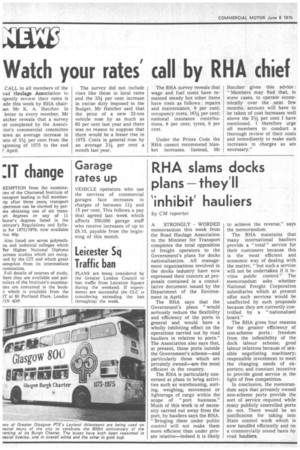RHA slams docks plans — they'll 'inhibit' hauliers
Page 6

If you've noticed an error in this article please click here to report it so we can fix it.
by CM reporter A STRONGLY WORDED memorandum this week from the Road Haulage Association to the Minister for Transport completes the total opposition of freight operators to the Government's plans for docks nationalisation. All management organisations involved in the docks industry have now expressed their concern at proposals contained in a consultative document issued by the Department of the Environment in April.
The RHA says that the Government's plans "would seriously reduce the flexibility and efficiency of the ports in general and would have a wholly inhibiting effect on the operations carried out by road hauliers in relation to ports." The Association also says that, at present, those ports outside the Government's scheme—and particularly those which are privately owned—are the most efficient in the country.
The RHA is particularly concerned at plans to bring activities such as warehousing, sorting, weighing, movement or lighterage of cargo within the scope of "port business." Much of this work is of necessity carried out away from the port, by hauliers says the RHA. "Bringing them under public control will not make them more efficient than under private iniative—indeed it is likely to achieve the reverse," says the memorandum.
The RHA maintains that many international hauliers provide a " total " service for their customers because this is the most efficient and economic way of dealing with the matter, " but such a service will not be undertaken if it invites public control." The memorandum asks whether National Freight Corporation subsidiaries which at present offer such services would be unaffected by such proposals because they are currently controlled by a "nationalised board."
The RHA gives four reasons for the greater efficiency of non-scheme ports : freedom from the inflexibility of the dock labour scheme; good labour relations because of sensible negotiating machinery; responsible investment to meet the changing needs of exporters; and constant incentive to provide good service in the light of free competition.
In conclusion, the memorandum says that privately owned non-scheme ports provide the sort of service required while many publicly controlled ports do not. There would be no justification for taking into State control work which is now handled efficiently and on a commercially sound basis by road hauliers.


















































































































